S.R. Piccoli's Blog, page 14
November 14, 2014
Are Appeals to Natural Law and Right Reason Still Effective?

Samuel Gregg in Crisis Magazine :
...The American Founding was suffused with the language of virtue. Alongside this went a conviction on the part of many Founders that there was a natural law that all humans could know. Hence someone such as Alexander Hamilton didn’t hesitate to affirm in his Farmer Refuted that “upon this law, depend the natural rights of mankind.” To which Hamilton immediately added: “the Supreme Being gave existence to man, together with the means of preserving and beautifying that existence. He endowed him with rational faculties, by the help of which, to discern and pursue such things.
It’s not an easy reading, but it is worth the effort—and your time will be well spent!COPYRIGHT NOTICE:
All original content of this blog [Wind Rose Hotel] is subject to
Creative Commons license (by-nc-sa)













Published on November 14, 2014 12:41
November 7, 2014
Once the Spirit Comes to Dwell in Someone
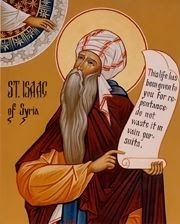 Isaac of Nineveh wrote in the seventh century: “Once the Spirit comes to dwell in someone, the latter will not be able to stop praying, for the Spirit will never stop praying inside him. Thus, whether he sleeps or wakes, prayer will never be absent from the person’s soul. Whether she is eating or drinking, or sleeping or working, the sweet fragrance of prayer will effortlessly breathe in his heart. Henceforth he no longer prays at fixed times, but continuously.” COPYRIGHT NOTICE:
Isaac of Nineveh wrote in the seventh century: “Once the Spirit comes to dwell in someone, the latter will not be able to stop praying, for the Spirit will never stop praying inside him. Thus, whether he sleeps or wakes, prayer will never be absent from the person’s soul. Whether she is eating or drinking, or sleeping or working, the sweet fragrance of prayer will effortlessly breathe in his heart. Henceforth he no longer prays at fixed times, but continuously.” COPYRIGHT NOTICE:All original content of this blog [Wind Rose Hotel] is subject to
Creative Commons license (by-nc-sa)













Published on November 07, 2014 10:21
November 6, 2014
A Republican AND Conservative Wave

Tuesday was not just a Republican wave, it was also a conservative wave. All across the country, conservative incumbents and challengers, won in races that they were supposed to lose. Conservatives won in gubernatorial races on down the ballot U.S. House races and state legislative races...
A short and clear synthesis (at Human Events, by Ron Pearson and Trevor K. Smith).COPYRIGHT NOTICE:
All original content of this blog [Wind Rose Hotel] is subject to
Creative Commons license (by-nc-sa)













Published on November 06, 2014 12:23
October 28, 2014
Hey, Christmas Is Not Too Far Away!
Everyone has his own specific vocation or mission in life; everyone must carry out a concrete assignment that demands fulfillment. Elvis had his own and he accomplished it so well that we are still inspired by all the amazing songs he left us. Inspired and thankful. This video is a reminder that Christmas is not too far away...
Post by EPN: Elvis Presley News.
COPYRIGHT NOTICE:
All original content of this blog [Wind Rose Hotel] is subject to
Creative Commons license (by-nc-sa)













Post by EPN: Elvis Presley News.
COPYRIGHT NOTICE:
All original content of this blog [Wind Rose Hotel] is subject to
Creative Commons license (by-nc-sa)













Published on October 28, 2014 10:15
October 24, 2014
Being Conservative: New Facebook Page

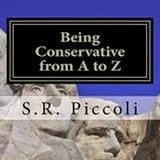 I've just created a Facebook page for my latest book, Being Conservative from A to Z! Please feel free to leave comments, reviews or click the "like" box.
I've just created a Facebook page for my latest book, Being Conservative from A to Z! Please feel free to leave comments, reviews or click the "like" box.Dearest readers, I'd like to take this opportunity to let you know that this will be the first post of a new series after a long silence on this blog. Get ready and hold on, a new beginning is almost upon us...
COPYRIGHT NOTICE:
All original content of this blog [Wind Rose Hotel] is subject to
Creative Commons license (by-nc-sa)













Published on October 24, 2014 14:48
June 22, 2014
On Being Conservative
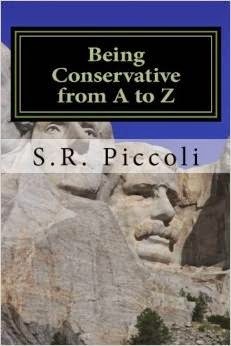 Asking too direct questions isn’t probably the best way to begin an investigation of a political movement or doctrine such as socialism, liberalism, conservatism, etc, because direct interrogation requires simple and straightforward answers, which is what is lacking in today’s complicated and often confusing political (and non-political) world. Therefore, if you want to find out the truth about a certain political belief, your question shouldn’t sound like this: What does it mean to be a Liberal, or a Socialist, etc.? This is even truer if we narrow the focus to the conservative movement, as I did in my newest book,
Being Conservative from A to Z: An Anthology and Guide for Busy Conservative-Minded People
.
Asking too direct questions isn’t probably the best way to begin an investigation of a political movement or doctrine such as socialism, liberalism, conservatism, etc, because direct interrogation requires simple and straightforward answers, which is what is lacking in today’s complicated and often confusing political (and non-political) world. Therefore, if you want to find out the truth about a certain political belief, your question shouldn’t sound like this: What does it mean to be a Liberal, or a Socialist, etc.? This is even truer if we narrow the focus to the conservative movement, as I did in my newest book,
Being Conservative from A to Z: An Anthology and Guide for Busy Conservative-Minded People
.As if that weren’t enough, things get even more complicated if we embrace the point of view of English philosopher Michael Oakeshott on being conservative: “My theme is not a creed or a doctrine, but a disposition. To be conservative is to be disposed to think and behave in certain manners; it is to prefer certain kinds of conduct and certain conditions of human circumstances to others; it is to be disposed to make certain kinds of choices…”
However, although debatable in many respects, Oakeshott’s definition of conservatism as a disposition rather than a belief from general principles is food for thought. Firstly, as a new kind of approach, it’s intellectually challenging and stimulating—more concrete, and therefore more understandable—to a complex and multi-faceted political philosophy. Secondly, it is pedagogically useful because it seems to automatically provide an abundant amount of information on a very wide variety of topics that are directly or closely related to the main subject. By the way, that’s the method used in this book. By looking through its pages one can easily perceive the operational scheme which consists of (implicitly) asking and answering questions such as “What does a conservative feel and think about this or that issue/topic/event?”
Michael Oakeshott’s above-quoted statement is from a lecture delivered at Swansea University, U.K., in 1956, but a similar sentiment was echoed almost forty years later by Russell Kirk in The Politics of Prudence:
Being neither a religion nor an ideology, the body of opinion termed conservatism possesses no Holy Writ and no Das Kapital to provide dogmata. So far as it is possible to determine what conservatives believe, the first principles of the conservative persuasion are derived from what leading conservative writers and public men have professed during the past two centuries. […]
Perhaps it would be well, most of the time, to use this word “conservative” as an adjective chiefly. For there exists no Model Conservative, and conservatism is the negation of ideology: it is a state of mind, a type of character, a way of looking at the civil social order.
The attitude we call conservatism is sustained by a body of sentiments, rather than by a system of ideological dogmata. It is almost true that a conservative may be defined as a person who thinks himself such. The conservative movement or body of opinion can accommodate a considerable diversity of views on a good many subjects, there being no Test Act or Thirty-Nine Articles of the conservative creed.
In its own way, Being Conservative from A to Z reflects the above-described approach, since “by default” it refers to what important leading conservative thinkers and public men have professed during the past two centuries up until the present time, no matter how many or how big the differences between the various thinkers on many issues might be.
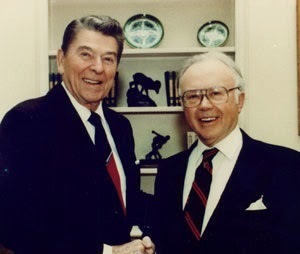 Ronald Reagan and Russell KirkThat being said, however, as Russell Kirk himself points out, there is a great line of demarcation in modern politics: on one side of that line are those who think that the temporal order is the only order, and in consequence material needs are the only needs, on the other side are those who “recognize an enduring moral order in the universe” and “a constant human nature.” As Eric Vogelin put it, the fundamental source of order in history and society is rooted in experiences of transcendence, in the attunement to divine reality. In other words, and as Voegelin himself would put it, the line of demarcation is between those who think that religious experience is the ground of political order and those who don’t. That is where we must start. And as a matter of fact, this is how Russell Kirk’s famous list of ten conservative principles (“Ten Conservative Principles,” in The Politics of Prudence) begins: “First, the conservative believes that there exists an enduring moral order. That order is made for man, and man is made for it: human nature is a constant, and moral truths are permanent.” The rest of the list—widely regarded as perhaps the best general definition of “conservative”—is interesting as well.
Ronald Reagan and Russell KirkThat being said, however, as Russell Kirk himself points out, there is a great line of demarcation in modern politics: on one side of that line are those who think that the temporal order is the only order, and in consequence material needs are the only needs, on the other side are those who “recognize an enduring moral order in the universe” and “a constant human nature.” As Eric Vogelin put it, the fundamental source of order in history and society is rooted in experiences of transcendence, in the attunement to divine reality. In other words, and as Voegelin himself would put it, the line of demarcation is between those who think that religious experience is the ground of political order and those who don’t. That is where we must start. And as a matter of fact, this is how Russell Kirk’s famous list of ten conservative principles (“Ten Conservative Principles,” in The Politics of Prudence) begins: “First, the conservative believes that there exists an enduring moral order. That order is made for man, and man is made for it: human nature is a constant, and moral truths are permanent.” The rest of the list—widely regarded as perhaps the best general definition of “conservative”—is interesting as well.Being Conservative from A to Z, which could be described as an anthology of conservative analysis and insights on some key issues, is for readers who wish to acquaint themselves with conservative political thought and to get a critical and comparative perspective on what passes for political, social, economic, and cultural conservatism in their own time and place.
The volume contains an introduction, 26 chapters and two appendixes. Each chapter corresponds to a letter of the alphabet, which in turn corresponds to a specific issue (e.g. A=American Revolution, B=Bigotry (from Atheists), C= Conservative Attitude, D=Deconstruction, E=Education, F=Family Values… I=Identity, M=Man’s Nature, etc.). The first appendix gives an overview of the “Kinds of Conservatism.” The second appendix, merely by way of example, reproduces a famous speech by Ronald Reagan.
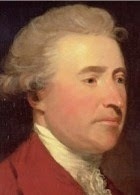 Edmund BurkeThe book is intended for both European and American readers. It provides readings from European and American thinkers, which besides may help to call attention to some of the peculiarities of American conservatives, who, for instance, believe in Progress even more than liberals do. Last but not least, as the subtitle reads, this volume wants to be a teaching tool and a guide “for busy conservative-minded people,” even though I must confess that I don’t know what “busy people”—whether conservative-minded or not—exactly means...
Edmund BurkeThe book is intended for both European and American readers. It provides readings from European and American thinkers, which besides may help to call attention to some of the peculiarities of American conservatives, who, for instance, believe in Progress even more than liberals do. Last but not least, as the subtitle reads, this volume wants to be a teaching tool and a guide “for busy conservative-minded people,” even though I must confess that I don’t know what “busy people”—whether conservative-minded or not—exactly means...Be it as it may, despite its brevity and modesty, I hope this book, will lead readers to a greater appreciation of conservative values and principles. After all, as we all know, the ways of the Lord are mysterious.
COPYRIGHT NOTICE:
All original content of this blog [Wind Rose Hotel] is subject to
Creative Commons license (by-nc-sa)













Published on June 22, 2014 15:37
January 24, 2013
Why I Wrote 'Blessed Are the Contrarians'
I wrote this note for a Group at Goodreads.com called “The reasons why you wrote your book or books,” but I think it fits here, too.
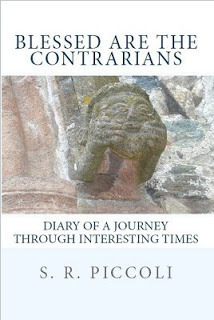
There is no specific reason why I wrote Blessed Are the Contrarians , nor was there ever even any decision to write it. In fact, as the subtitle reads, my book is a Diary of a Journey Through Interesting Times. I mean, I didn’t originally want to “write a book,” I just came to the decision of writing a blog, that is an online diary, or a daily pulpit, or whatever you want to call it. The book is just a side-effect, so to speak, of the original purpose of creating and maintaining a blog.
As a matter of fact, I have collected in this volume some of the pieces which I have posted on my blog over the last few years, namely the most suitable to this traditional mode of communication. As a result, Blessed Are the Contrarians is a kind of diary of a journey through our time (politics, culture, lifestyles, worldviews, etc.). And, I would add, back home again, where “home” stands for a sense of belonging to something stronger than the spirit of our times. In other words what this book is all about is explaining—though not in a systematic way—why I disagree with mainstream views in several areas. And this from a conservative and Christian point of view, that is to say the perspectives which, in turn, come under severe attacks from secular and progressive ideologies, namely the most influential schools of thought of our time.
To conclude, the question ‘Why did I write this book?’ should be changed to ‘Why did I decide to create a blog?’ And the answer is ‘Simply because I had to.’ Because everyone is called to witness to what they have seen and heard, and to what they believe in. COPYRIGHT NOTICE:
All original content of this blog [Wind Rose Hotel] is subject to
Creative Commons license (by-nc-sa)














There is no specific reason why I wrote Blessed Are the Contrarians , nor was there ever even any decision to write it. In fact, as the subtitle reads, my book is a Diary of a Journey Through Interesting Times. I mean, I didn’t originally want to “write a book,” I just came to the decision of writing a blog, that is an online diary, or a daily pulpit, or whatever you want to call it. The book is just a side-effect, so to speak, of the original purpose of creating and maintaining a blog.
As a matter of fact, I have collected in this volume some of the pieces which I have posted on my blog over the last few years, namely the most suitable to this traditional mode of communication. As a result, Blessed Are the Contrarians is a kind of diary of a journey through our time (politics, culture, lifestyles, worldviews, etc.). And, I would add, back home again, where “home” stands for a sense of belonging to something stronger than the spirit of our times. In other words what this book is all about is explaining—though not in a systematic way—why I disagree with mainstream views in several areas. And this from a conservative and Christian point of view, that is to say the perspectives which, in turn, come under severe attacks from secular and progressive ideologies, namely the most influential schools of thought of our time.
To conclude, the question ‘Why did I write this book?’ should be changed to ‘Why did I decide to create a blog?’ And the answer is ‘Simply because I had to.’ Because everyone is called to witness to what they have seen and heard, and to what they believe in. COPYRIGHT NOTICE:
All original content of this blog [Wind Rose Hotel] is subject to
Creative Commons license (by-nc-sa)













Published on January 24, 2013 15:10
January 6, 2013
A Review of Blessed Are the Contrarians: Diary of a Journey Through Interesting Times
~ “LETTERS FROM AMERICA” - by The Metaphysical Peregrine ~
 Yesterday finished reading Rob's Blessed Are theContrarians: Diary of a Journey Through Interesting Times. It's a worthwhile read, and a great reminder of ideas we often neglect in our busy lives. It's good to take some time to review events and ideas, especially with Rob's perspective of a Conservative and Christian. Fewer thinkers like him, especially in secularist Europe, are offering any alternative view of politics, religion, Christianity, literature, and philosophy. What he offers here, all in one place, is something different from the zeitgeist, the meme of the times. His title is apt.
Yesterday finished reading Rob's Blessed Are theContrarians: Diary of a Journey Through Interesting Times. It's a worthwhile read, and a great reminder of ideas we often neglect in our busy lives. It's good to take some time to review events and ideas, especially with Rob's perspective of a Conservative and Christian. Fewer thinkers like him, especially in secularist Europe, are offering any alternative view of politics, religion, Christianity, literature, and philosophy. What he offers here, all in one place, is something different from the zeitgeist, the meme of the times. His title is apt.
Being American, we don't get any news from Europe, let alone detailed history and analysis of what's happening there; especially Italy. That section of this book helps get a handle, as much as possible anyway, of how Italy manages to offer so many fine things, even be productive, with such a dysfunctional government. It also helps get a handle on European politics and how the political class there is consolidating power and the conflicts that arise from that.
 I've been reading "The Windrose Hotel" for a few years (and am honored beyond words that I can contribute). What drew me to it initially was Rob's sense and sensibility, understanding of, explanation and explication of Augustine. Augustine has always been a tough slog for me, but Rob had, and has, a way of explaining Augustine's ideas that settles well. By the end of reading "Contrarians" I was on Amazon looking at Kindle downloads of Augustine's works. It's a good thing to have those writings all combined in this book; provides a clearer understanding.
I've been reading "The Windrose Hotel" for a few years (and am honored beyond words that I can contribute). What drew me to it initially was Rob's sense and sensibility, understanding of, explanation and explication of Augustine. Augustine has always been a tough slog for me, but Rob had, and has, a way of explaining Augustine's ideas that settles well. By the end of reading "Contrarians" I was on Amazon looking at Kindle downloads of Augustine's works. It's a good thing to have those writings all combined in this book; provides a clearer understanding.
There's a lot of coverage of art, something that is totally neglected in this country. Rob provides discussions of great artists, and why they're great, from both art history and personal perspectives. Art here in the US, and art writing, is dreadful. It's great to have Rob's observations without the snobbishness prevalent here, just the critical eye and heartfelt appreciation.
The last of the book is about our Faith, Christianity. I was both moved and stimulated, and was making notes to myself of things to pursue, teach and write about.
It's all here, ideas and reality, news and views, art and history, philosophy and perception, politics and religion. Sad that correct thinking is now contrary, but good that Rob's blog and this book makes the contrary accessible and understandable. COPYRIGHT NOTICE:
All original content of this blog [Wind Rose Hotel] is subject to
Creative Commons license (by-nc-sa)













 Yesterday finished reading Rob's Blessed Are theContrarians: Diary of a Journey Through Interesting Times. It's a worthwhile read, and a great reminder of ideas we often neglect in our busy lives. It's good to take some time to review events and ideas, especially with Rob's perspective of a Conservative and Christian. Fewer thinkers like him, especially in secularist Europe, are offering any alternative view of politics, religion, Christianity, literature, and philosophy. What he offers here, all in one place, is something different from the zeitgeist, the meme of the times. His title is apt.
Yesterday finished reading Rob's Blessed Are theContrarians: Diary of a Journey Through Interesting Times. It's a worthwhile read, and a great reminder of ideas we often neglect in our busy lives. It's good to take some time to review events and ideas, especially with Rob's perspective of a Conservative and Christian. Fewer thinkers like him, especially in secularist Europe, are offering any alternative view of politics, religion, Christianity, literature, and philosophy. What he offers here, all in one place, is something different from the zeitgeist, the meme of the times. His title is apt. Being American, we don't get any news from Europe, let alone detailed history and analysis of what's happening there; especially Italy. That section of this book helps get a handle, as much as possible anyway, of how Italy manages to offer so many fine things, even be productive, with such a dysfunctional government. It also helps get a handle on European politics and how the political class there is consolidating power and the conflicts that arise from that.
 I've been reading "The Windrose Hotel" for a few years (and am honored beyond words that I can contribute). What drew me to it initially was Rob's sense and sensibility, understanding of, explanation and explication of Augustine. Augustine has always been a tough slog for me, but Rob had, and has, a way of explaining Augustine's ideas that settles well. By the end of reading "Contrarians" I was on Amazon looking at Kindle downloads of Augustine's works. It's a good thing to have those writings all combined in this book; provides a clearer understanding.
I've been reading "The Windrose Hotel" for a few years (and am honored beyond words that I can contribute). What drew me to it initially was Rob's sense and sensibility, understanding of, explanation and explication of Augustine. Augustine has always been a tough slog for me, but Rob had, and has, a way of explaining Augustine's ideas that settles well. By the end of reading "Contrarians" I was on Amazon looking at Kindle downloads of Augustine's works. It's a good thing to have those writings all combined in this book; provides a clearer understanding.There's a lot of coverage of art, something that is totally neglected in this country. Rob provides discussions of great artists, and why they're great, from both art history and personal perspectives. Art here in the US, and art writing, is dreadful. It's great to have Rob's observations without the snobbishness prevalent here, just the critical eye and heartfelt appreciation.
The last of the book is about our Faith, Christianity. I was both moved and stimulated, and was making notes to myself of things to pursue, teach and write about.
It's all here, ideas and reality, news and views, art and history, philosophy and perception, politics and religion. Sad that correct thinking is now contrary, but good that Rob's blog and this book makes the contrary accessible and understandable. COPYRIGHT NOTICE:
All original content of this blog [Wind Rose Hotel] is subject to
Creative Commons license (by-nc-sa)













Published on January 06, 2013 06:53
December 24, 2012
Blessed Are the Contrarians

All right, that’s it, I’m done with this job. My new book is out just in time for Christmas. Here is the Preface to Blessed Are the Contrarians: Diary of a Journey Through Interesting Times.
I wish you all
a Merry Christmas and a Happy New Year!
PREFACE
Blessed are the contrarians, for theirs is the kingdom of heaven. But they must be very, very careful in these “Interesting Times,” in the Chinese sense. Unless you think that “May you live in interesting times” after all is a blessing and not a curse, or better still the first of three curses of increasing degrees of severity, the other two being “May the government be aware of you,” and “May you find what you are looking for.” But in this case you had better not read this book—and you can’t say I didn’t warn you!
Let’s start from the beginning, which can only be the title of this book, with the first question: Who or what is a contrarian? Well, that is not an easy question to answer. The fact is that there are many kinds of contrarians. Way too many to come up with a description that fits them all.
Broadly speaking, however, contrarians are those who go against the current (as the dictionary states), who take opposing stands from the majority: in the stock markets they buy when others sell and vice-versa; in religious matters, if they are Christians, they continue to believe that Jesus is the Christ, the Son of God, in spite of the Zeitgeist, and if they are not they have the utmost respect for what Christianity is all about and for its contribution to civilization. In matters of culture, education and lifestyles, they are “old-fashioned” while the rest of the world seems to be hell bent on transmuting order into chaos.
Philosophically speaking, there are two main types of contrarians: thinkers who are marginal and unconventional during their own life time, but posthumously become very popular and trendy, and those who “thought different” in their lifetime, to quote Steve Jobs, and their works still continue to go against the mainstream in the present time. Friedrich Nietzsche, for instance, belongs to the first category, whilst Montaigne belongs to the second—that of the truest and the most representative contrarians, in my own personal (and perhaps questionable) opinion. And that’s where I shall start from, as you will see.
This book is a kind of diary of a journey through our time—politics, culture, lifestyles, worldviews, etc.—and back home again, where “home” stands for a sense of belonging to something stronger than the spirit of our times. In other words what this book represents is a sort of explanation—though not a systematic one—of why I disagree with certain mainstream views in several domains. And this from a conservative and Christian point of view, that is to say the perspectives that come under severe attack from secular and progressive ideologies, the over-influential schools of thought of our time.
I have selected for this volume some of the articles posted on my blog over the last few years, those most suitable for this traditional mode of communication. The “diary” entries are not arranged in any chronological order, but in accordance to subject pertinence. This was done to make it easier for the reader to surf through the book. After all, as Albert Einstein once said, time is only an illusion—though sometimes an interesting one!
COPYRIGHT NOTICE:
All original content of this blog [Wind Rose Hotel] is subject to
Creative Commons license (by-nc-sa)













Published on December 24, 2012 06:48
December 2, 2012
The Infinite Quest

Hold tight, dear readers, what this note is all about is nothing less than the Infinite. Tough topic, I know (and how could it be otherwise?), but it’s time, if not past time, because yesterday was not just an ordinary day. In fact yesterday we celebrated the first Sunday of Advent. So what?—you’ll say. Well, you know that we Christians traditionally mark Advent with the display of a wreath? And if so, do you know what does the wreath stand for? No? Well, I give you a clue: the wreath is circular… I hope you’ve got it now: the wreath circle reminds us of God Himself, eternal and endlessly merciful. It is evergreen—reminding us of the hope of eternal life. In other words, Advent tells us about the manifold attributes of the Infinite!
That being said, let’s get into our topic. But in order to do so, I need to resort to poetry, which, along with theology and philosophy, is the best way to express—although partly and indirectly—what the Infinite is all about. Specifically, I’ll first talk about what seems to be a fascinating intellectual paradox, but it isn’t: I mean, the “phenomenon” may well be fascinating, but on closer inspection it’s not a paradox. I’m referring to the religious reading of one of the greatest Italian poets ever, Giacomo Leopardi, whose deeply pessimistic Weltanschauung, in both a “historical” and a “cosmic” sense, is based on an empirical and mechanistic world view (inspired, among others, by John Locke), denying purpose in the universe, and seeking to explain all phenomena solely by efficient causality.
As a matter of fact, in much of Leopardi’s poetry , the principal poetic mood is melancholic, and themes of solitude, suffering, despair, and disappointed love largely predominate. He often stresses his belief that joy is nothing but the momentary subsidence of pain and that only in death can man find lasting happiness, and his prose writings are eloquent articulations of his materialist, atheistic, skeptical, and decidedly “modern” thought—affinities between his pessimistic worldview and that of Arthur Schopenhauer, for instance, have been noted, while Friedrich Nietzsche found Leopardi’s historical insights congenial to his own.
Yet, from time to time, quite different (though not contradictory) aspects of his personality emerge: an immense admiration of nature’s beauty, a deep belief in the power of imagination, and a characteristically Romantic longing for the infinite (see, for instance, Matthew Arnold’s 1882 comparison of Leopardi with the English Romantic poets Lord Byron and William Wordsworth).
In a nutshell, Leopardi thinks that we human beings seek an infinite fulfillment, an infinite coherence, an infinite wisdom and comprehension, an infinite love, an infinite perfection. But we do not have the capacity to achieve any of these things, and the mystery of life, the mystery of happiness, seems always one step beyond us. Yet, does this necessarily mean that, at the end of the road, there’s only darkness and despair? Perhaps so.
Embedded in that “perhaps” is the possibility of hope. By our own power we are hopeless, but, as St Augustine wrote in his Confessions, “Thou hast made us for Thyself, O Lord, and our hearts are restless until they rest in Thee” (Nos fecisti ad te et inquietum est cor nostrum donec requiescat in te). Leopardi’s “restless heart,” far more than his pessimistic world-view, is what his wonderful poem “Canto notturno di un pastore errante dell’Asia” (Night Song of a Wandering Shepherd in Asia) seems to be all about.
By the way, this could somehow explain why something unexpected happened to an Italian priest, a very famous one: Fr Luigi Giussani, the founder and spiritual guide of the Communion and Liberation movement. In fact, he happened to read Leopardi’s hymn “Alla sua donna” (To his Woman) as … a sort of introduction to the prologue to the Gospel of St John, and what is more, Leopardi became his favorite poet and a life-long “friend.”
In this last regard, the following except from Paul Zalonski’s essay “What is Luigi Giussani’s Contribution to Catholic Theology? Part II: Nothing Less Than the Infinite” (Communio, October 28, 2008) can be very useful.
Giussani quotes the great 19th century Italian poet Giacomo Leopardi--who is speaking here in the persona of a shepherd watching his flock by night, conversing with the moon:
And when I gaze upon you,
Who mutely stand above the desert plains
Which heaven with its far circle but confines,
Or often, when I see you
Following step by step my flock and me,
Or watch the stars that shine there in the sky,
Musing, I say within me:
“Wherefore those many lights,
That boundless atmosphere,
And infinite calm sky? And what the meaning
Of this vast solitude? And what am I?”
There are a couple of points about this striking poetic excerpt that are worth mentioning as illustrative of central themes in Giussani. The first point is this: note that the shepherd's questions are so poignantly expressed "from the heart “(Musing, I say within me). They are "personal “questions we might say; that is, they are questions that seem deeply important to the shepherd's own life, that emerge from the shepherd's solitude as he watches the flocks by night and gazes at the moon. And yet, the questions themselves are really “philosophical” questions: “metaphysical” questions which ask about the relationship of the universe to its mysterious Source, and “anthropological” questions about the nature of the world, of man, of the self. Let us note these things only to emphasize that Giussani’s evaluation of the dynamic of the human heart is not exclusively concerned with the pursuit of external objects and the way in which these objects lead “beyond” themselves the acting person who engages them. Giussani stresses that the need for truth is inscribed on the human heart; the need to see the meaning of things is fundamental to man. Hence the “objectivity” required for addressing philosophical and scientific questions does not imply that these questions are detached from the “heart” of the person who deals with them. When the scientist scans that infinite, calm sky and that vast solitude with his telescope, he must record what he sees, not what he wishes he would have seen. In this sense, he must be “objective,” and his questions and methodology must be detached from his own particular interests. But what puts him behind that telescope in the first place is his own personal need for truth and this need grows and articulates itself more and more as questions emerge in the light of his discoveries. All of this could be applied by analogy to the researches carried out by a true philosopher.
The second point is this: Leopardi’s poem conveys with imaginative force the inexhaustibility of human desire and the questions through which it is expressed, or at least tends to be expressed insofar as man is willing to live in a way that is true to himself (several chapters of Giussani’s book are devoted to the various ways in which man is capable of distracting himself or ignoring the dynamic of the religious sense, or anesthetizing himself against its felt urgency). Even more importantly, he indicates that the unlimited character of man’s most fundamental questions points toward an Infinite Mystery, a mystery that man continually stands in front of with fascination and existential hunger but also with questions, because he is ultimately unable by his own power to unveil its secrets.
The experience of life teaches man, if he is willing to pay attention to it, that what he is truly seeking, in every circumstance is the unfathomable mystery which alone corresponds to the depths of his soul. Offer to man anything less than the Infinite and you will frustrate him, whether he admits it or not. Yet at the same time man is not able to grasp the Infinite by his own power. Man's power is limited, and anything it attains it finitizes, reducing it to the measure of itself. The desire of man as a person, however, is unlimited, which means that man does not have the power to completely satisfy himself; anything that he makes is going to be less than the Infinite.
Here we begin to see clearly why Giussani holds that the ultimate questions regarding the meaning, the value, and the purpose of life have a religious character; and how it is that these questions are asked by everyone within the ordinary, non-theoretical reasoning process which he terms “the religious sense.” The human heart is, in fact, a great, burning question, a plea, an insatiable hunger, a fascination and a desire for the unfathomable mystery that underlies reality and that gives life its meaning and value. This mystery is something Other than any of the limited things that we can perceive or produce; indeed it is their fundamental Source. Therefore, the all-encompassing and limitless search that constitutes the human heart and shapes our approach to everything is a religious search. It is indeed, as we shall see in a moment, a search for “God.”
We seek an infinite fulfillment, an infinite coherence, an infinite interpenetration of unity between persons, an infinite wisdom and comprehension, an infinite love, an infinite perfection. But we do not have the capacity to achieve any of these things by our own power. Yet, in spite of this incapacity, in spite of the fact that the mystery of life--the mystery of happiness--seems always one step beyond us, our natural inclination is not one of despair, but rather one of dogged persistence and constant hope. Giussani insists that this hope and expectation is what most profoundly shapes the self; when I say the word “I,” I express this center of hope and expectation of infinite perfection and happiness that is coextensive with myself, that “is” myself, my heart. And when I say the word “you,” truly and with love, then I am acknowledging that same undying hope that shapes your self.
COPYRIGHT NOTICE:
All original content of this blog [Wind Rose Hotel] is subject to
Creative Commons license (by-nc-sa)













Published on December 02, 2012 23:49



